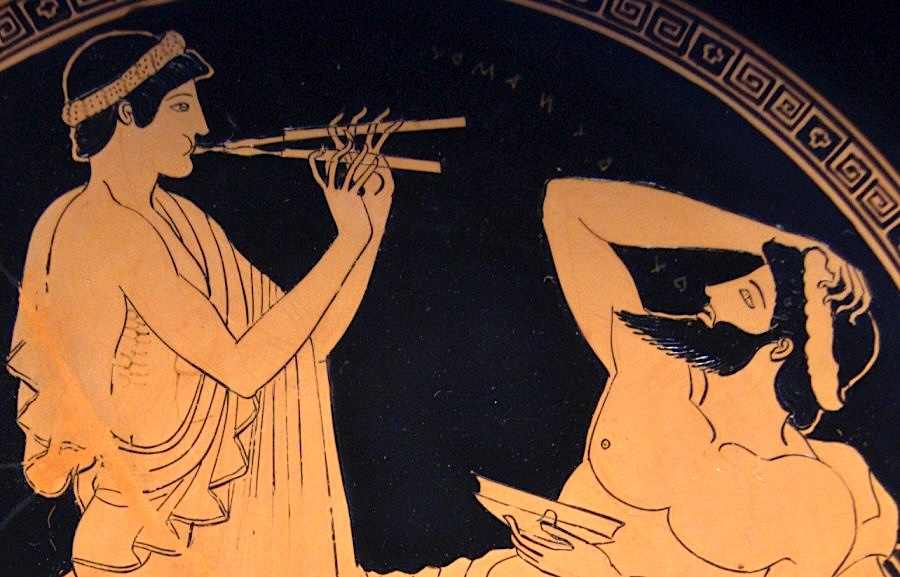
Between 750 BC and 400 BC, the Ancient Greeks composed songs meant to be accompanied by the lyre, reed-pipes, and various percussion instruments. More than 2,000 years later, modern scholars have finally figured out how to reconstruct and perform these songs with (it’s claimed) 100% accuracy.
Writing on the BBC website, Armand D’Angour, a musician and tutor in classics at Oxford University, notes:
[Ancient Greek] instruments are known from descriptions, paintings and archaeological remains, which allow us to establish the timbres and range of pitches they produced.
And now, new revelations about ancient Greek music have emerged from a few dozen ancient documents inscribed with a vocal notation devised around 450 BC, consisting of alphabetic letters and signs placed above the vowels of the Greek words.
The Greeks had worked out the mathematical ratios of musical intervals — an octave is 2:1, a fifth 3:2, a fourth 4:3, and so on.
The notation gives an accurate indication of relative pitch.
So what did Greek music sound like? Below you can listen to David Creese, a classicist from the University of Newcastle, playing “an ancient Greek song taken from stone inscriptions constructed on an eight-string ‘canon’ (a zither-like instrument) with movable bridges. “The tune is credited to Seikilos,” says Archaeology Magazine.
For more information on all of this, read D’Angour’s article over at the BBC.
Note: An earlier version of this post appeared on our site in October, 2013.
If you would like to sign up for Open Culture’s free email newsletter, please find it here. It’s a great way to see our new posts, all bundled in one email, each day.
If you would like to support the mission of Open Culture, consider making a donation to our site. It’s hard to rely 100% on ads, and your contributions will help us continue providing the best free cultural and educational materials to learners everywhere. You can contribute through PayPal, Patreon, and Venmo (@openculture). Thanks!
Related Content:
Hear What Homer’s Odyssey Sounded Like When Sung in the Original Ancient Greek
Hear Homer’s Iliad Read in the Original Ancient Greek
Hear the Oldest Song in the World: A Sumerian Hymn Written 3,400 Years Ago
Hear The Epic of Gilgamesh Read in the Original Akkadian, the Language of Mesopotamia


Not exactly foot stomping.
Let us hope the Greeks could tune their instruments better than this one.
That’s exactly what I thought. Although we should be grateful for this offering; perhaps we shouldn’t expect historians to have an excellent musical ear.
100% not tuned
For everyone complaining about the tune: The tuning isn’t off for this song. It’s perfectly fine. Ancient Greeks used a different system than us, incorporating microtones frequently. To them, our modern classical and folk music would sound just as peculiar.
The tuning isn’t wrong. Ancient Greeks just didn’t have the same musical scales as us, at the time
It’s correctly tuned. Just not in a Western scale, like most of us are used to
Greek tunings were less about standardization and more about aligning with philosophical ideals and the expressive needs of the music. They valued the purity of intervals and the flexibility to adjust to different modes and instruments, creating a musical landscape vastly different from our equal-tempered system, which prioritizes convenience and versatility across all keys. So,in essence, they were perfectly in tune.
The relative pitch could be 100% accurate, and maybe the words, but I don’t think we can know the pronunciation of the words with 100% accuracy (and were there regional variations?). Timbre can be affected as the instrument ages, and the new material of reconstructions may not be identical to the old even if it’s the same kind of plant or animal. This leaves out other elements of music that can’t be 100% known, such as speed, phrasing, articulation, singing technique, and more.
Signed, someone who’s spent enough time hearing about historical performance practice to have become a real spoilsport